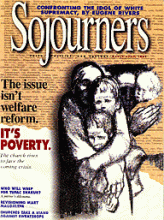Eugene F. Rivers 3d, a Sojourners contributing editor, is pastor of the Azusa Christian Community in Dorchester, Massachusetts, a pentecostal base Christian Community founded by African-American students from Harvard University and Massachusetts Institute of Technology, and co-chair of the National Ten-Point Leadership Foundation. For more than 10 years, Azusa has committed itself to working among the poor in the urban context.
Rivers addressed the 1996 conference "The Legacy of William Stringfellow" at the Washington and Lee University School of Law in Lexington, Virginia, adapting Stringfellows framework of powers and principalities to look at the current racial climate in the United States. In his remarks, from which this article is adapted, Rivers argues that the demonic ideology of white supremacy is the dominant principle governing American culture. And he challenges "white people"a category he believes to be false at its coreto make a choice...between their God and their whiteness. The Editors
I met William Stringfellow in 1973, at Princeton Theological Seminary at a conference discussing the integration of biblical faith and a new political vision. Then a refugee from a mainline black pentecostal church in North Philadelphia, I jumped at the opportunity to attend. Stringfellow said something there that has stuck with me for the last 25 years, and has been confirmed in my own practical work: Speaking in tongues is a political act of resistance.
At the time, pentecostalism was viewed by the sophisticated, upper-middle-class, elite activists as a religious expression of people who dragged their knuckles on the ground. But beneath the surface, and beyond the eyes of these sophisticates, God was doing something among the pentecostal poor.
Read the Full Article

